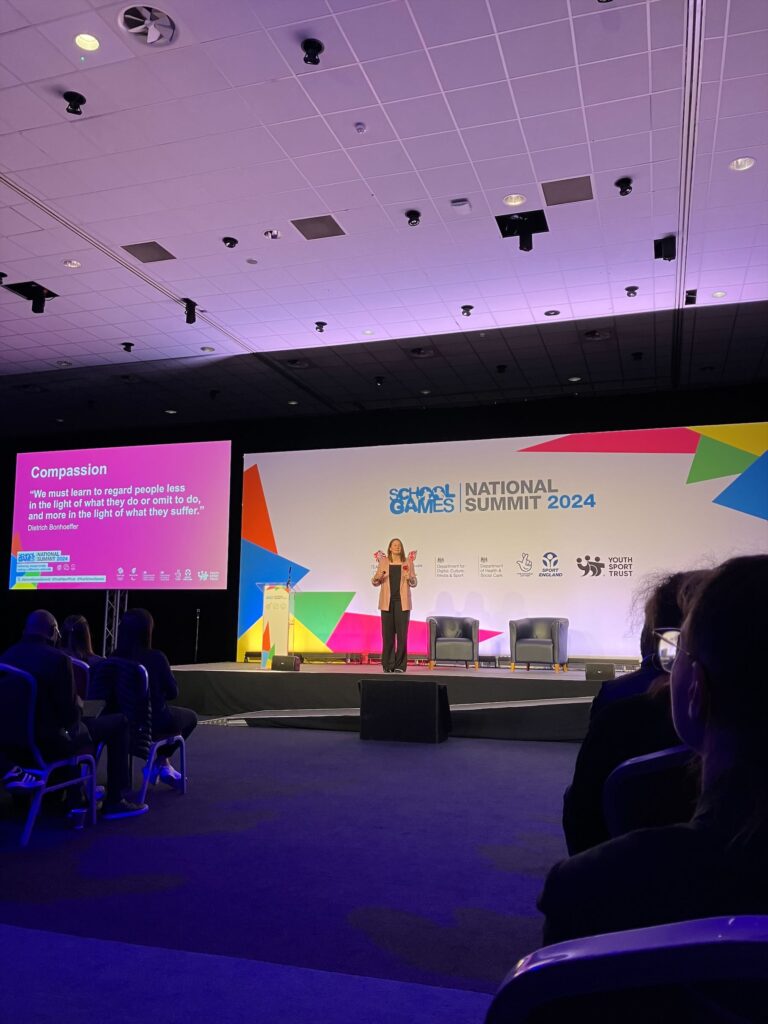- To mark National School Sports Week 2024, we’re reflecting on some of the key takeaways from last week’s School Games National Summit,
- London Sport joins over 400 School Games Organisers (SGO),
Active Partnerships, National Governing Bodies (NGB), and National Disability Sports Organisations (NDSO) at School Games National Summit 2024 - Event provides valuable opportunity to reflect on impact of School Games, share learnings, and explore innovative solutions to challenges within the sector
19 June 2024, London – London Sport has attended this year’s School Games National Summit, participating in workshops to take learnings from School Games and offering valuable insights and transferable learnings from the Opening School Facilities (OSF) fund, which is administered by London Sport in the capital and currently supports 173 schools.
Launched in 2010, School Games aims to promote young people’s enjoyment of physical activity by providing inclusive opportunities to participate in sport competitions. Since its inception, the programme has delivered over 13.4 million competitions across England. It’s also provided over 70,000 leadership opportunities to young people in the last year alone.
In July 2023, the School Games Network committed to three pledges: tackling inequalities, embedding youth engagement, and ensuring physical literacy. Each workshop at this year’s summit was dedicated to one of the Network’s pledges:
For young people by young people – moving to co-design
This workshop was led by League Leaders and an SGO who collaborated with a secondary school to engage a cohort of disengaged young people. They discussed a range of strategies, such as the involvement of ‘Sport Leaders’ — students in Years 5-6 who lead activities for younger pupils and interact with them in a relaxed setting to uncover interests that might not otherwise be shared. This approach offered several benefits; it not only engaged inactive youth in co-design processes, but also mobilised students through leadership experiences and fostered connections between different age groups.
Key tips on how to communicate with young people before, during and after School Games events to enhance their experience
This session delved into some of the ways school games can be made more accessible to young people with special educational needs and disabilities (SEND). The workshop highlighted common differences between neurotypical and neurodivergent communication, and offered strategies to promote inclusivity. These included providing a checklist of what to expect at each competition and sharing videos of venues in advance. The workshop underscored that inclusive communication isn’t just about style or format; it’s about being prepared to think outside the box and challenge our ways of working to ensure that pupils feel confident, prepared, and valued.
Creating Equal Opportunities in PE and School Sport
With a focus on helping schools achieve the new School Games Mark, this workshop explored the hidden challenges that schools face, including the low percentage of girls who wear sports bras during school sports activities. The workshop facilitators discussed the negative effects of this, citing research from Women in Sport which reveals that over 69% of girls feel restricted in their ability to jump or run freely. We discussed the need for sports bras to be regarded as essential kit for girls, with a focus on making them more accessible and affordable for all.
In their shoes: applying physical literacy from the perspective of young people
During this workshop, participants were assigned a student profile and asked to engage in a range of activities while empathising with that particular profile. This approach encouraged us to delve deeper into how people think, feel, move, and connect with physical activity in unique ways. It highlighted the value of creativity in adapting games, particularly for fostering a sense of ownership over movement and offering diverse opportunities for enjoyment.
Sport England’s Executive Director of Policy and Integrity, Jeanette Bain-Burnett, led an insightful Q&A and underscored the vital role that SGOs play in enabling physical literacy in schools, noting that we can’t achieve this goal “without boots on the ground.” She advocated for an intersectional approach to equity in sport, reinforcing the ‘In Their Shoes’ workshop message: to enhance physical literacy among inactive young people, we must keep the diversity of their experiences front of mind. The Q&A was followed by a keynote speech from self-described ‘resilience ninja’, Jaz Ampaw-Farr, who called on us to be “10% braver” and discussed the transformative impact that courage has on driving positive societal change.
If you’re interested in learning more about School Games or would like to get involved, you can do so here.
About London Sport
London Sport is a charity that exists to help ensure more Londoners live happier, healthier lives through access to sport and physical activity.
Supported by Sport England and the Mayor of London, London Sport collaborates with those that share our vision, running and supporting projects that help children, young people and the least active adults to embed sport and physical activity into their lives.
For more information on London Sport, visit www.londonsport.org
For further comment or interview opportunities, please contact: [email protected]

